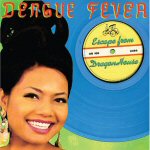
A few years ago, "dance" came back. Not as some ballroom revival, but as a buzzword. For example, the following have unequivocally earned approving nods in both alternative and mainstream press for containing that derriere-appealing je ne sais quoi: concerts that incite one to, parties that inspire a frenzied bout of, and songs that contain traces of (but are not exclusive to the genre) dance. Quite a contrast to not too long ago when the snoberatti considered a vacant stare and a glum swoon an indulgence. Now, the Rapture could be described as "post-punk disco". And that's a good thing.
So, I was, all, big fucking deal!
The funny thing is that dance is a natural part of music. Its invocation in terms of fashion seems embarrassingly obvious, like making "fragrant" the in word to describe perfume. After all, shoegazing may be the golf of dynamic movement, but it still (subtly) involves a body in motion; one person's wallflower sway can be another's 1, 2 step. And isn't that the universal bull's-eye of good music: the body? Hence, the motive power of music is more like a constant than a vogue. In other words, it ain't ever been hip if you didn't feel it there, as well.
The joy then of Dengue Fever is how they capture this quality in such a roundabout yet intuitive manner. Consisting of five American musicians versed in the gamut of Western pop music (Beck and Snoop Dogg to Dieselhead and the Radar Brothers) and a recently emigrated singer who had performed for the king and queen of her native Cambodia, the group began by covering -- what else? -- '60s Cambodian pop. Understandably, the audiences of Little Phnom Penh and Hollywood found this unexpected culture clash time warp to be highly curious, but they also recognized the familiar chords. The music was rooted in popular Western modes like rhythm and blues, surf and psychedelic, while prominently featuring Cambodian 'standards' and even Ethiopian rhythms. What Cambodian musicians had riffed on a generation prior was being re-spun by the new Young Americans for their Young American peers. And that the crowds responded with both circle dances and go-go spazz was a positive reaffirmation of the inescapable lure of good music.
On their second album, Escape From Dragon House, Dengue Fever retains their body movin' charm while adding a healthy dose of palpitation. Opting to write originals instead of performing covers, the band now balances whimsical footwork with touching heartache. The group takes command at first with "We Were Gonna" and the record's sole cover, "Tip My Canoe" (written by revered Cambodian pop stars Ros Serey Sothea and Sin Sisamouth), both bristling with trademark funk hustle and an airy caress of a melody. However, tracks like "One Thousand Tears of a Tarantula", which deals with the purported execution of Ms. Serey Sothea at the hands of the Khmer Rouge, unravel tension and horror through menacing horn squelches and elliptical minor key riffage. Even more than on the previous record's poignant moments, such as "22 Nights", singer Ch'hom Nimol reaches deep into her voice to drape "Sleepwalking Through the Mekong" in a thick fog, a cloudy passage through memory for a past melody. Indeed, Escape leaves the immediate appeal of barroom entertainment for more nuanced experiences.
In this manner, lead single "Sni Bong" best exemplifies Dengue Fever's burgeoning ability to navigate both past idioms and its unique presentation. With aplomb, the band balances farfisa riffs, balls-out rock choruses and even a rap bridge in Khmer. The result is unfamiliarly funky, yet appealing as a pop nugget. With little pretension or pandering, the band proves the existence of intelligent dance music.
Admittedly, Dengue Fever occasionally skirts developments in contemporary music in favor of a comforting pastime paradise. The title cut laces up its go-go boots while the tender "Hummingbird" sighs heavily under '60s sunshine. Even the indulgent soundscapes of "Saran Wrap" can't escape a past hash automatic writing exercise. Still, the group exhibits an effortless sense of fun throughout Escape. Considering the deluge of music with virtually conditioned responses -- Perfecto mixes dilate my eyes, while dueling banjos turn me off from pork -- the willingness of a group to break from the confines of Pavlovian responses should be applauded and encouraged. So, here's hoping future listeners make a similar escape and just dance to the Fever.